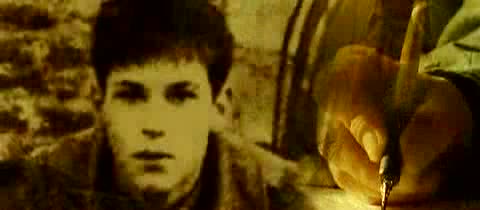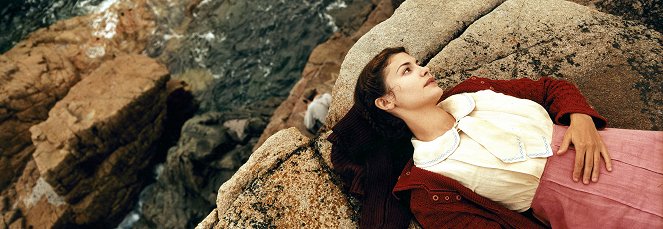Directed by:
Jean-Pierre JeunetCinematography:
Bruno DelbonnelComposer:
Angelo BadalamentiCast:
Audrey Tautou, Gaspard Ulliel, Dominique Pinon, Chantal Neuwirth, André Dussollier, Ticky Holgado, Marion Cotillard, Dominique Bettenfeld, Jodie Foster (more)VOD (3)
Plots(1)
The film is set in France near the end of World War I in the deadly trenches of the Somme, in the gilded Parisien halls of power, and in the modest home of an indomitable provincial girl. It tells the story of this young woman's relentless, moving and sometimes comic search for her fiancé, who has disappeared. He is one of five French soldiers believed to have been court-martialed under mysterious circumstances and pushed out of an allied trench into an almost-certain death in no-man's land. (official distributor synopsis)
(more)Videos (1)
Reviews (8)
It is all too evident how Jean-Pierre Jeunet strives to elevate the content to the level of the form, but he does not succeed. He alternates between a gray-black camera filter, which adds rawness to the war scenes, and a yellowish one, but unlike the war scenes, which I would compare to Saving Private Ryan, the romance did not impress me at all. Also the story is unnecessarily convoluted and often muddled.
()
Fragmentary in terms of story, perfect in terms of visuals and captivating in terms of music. In places it lacks substance and is rather long-winded, in other places it is indescribably emotionally powerful. Too bad that Audrey is stylized into her Amelie role again. Her acting talent is capable of more than just a grinning mademoiselle. Although the wartime interludes aren’t consistent with the rest of the movie, but they don’t pull down the overall high quality. The result is a crushing victory of form over content. But it’s a quality victory.
()
In terms of imagery, A Very Long Engagement is beautiful screenwriting chaos with excessive camera filters, fantastically beautiful sets and the extreme contrast between the cruelty of war and the tenderness of love. Its powerful, interesting scenes are offset by superficial kitschiness and music-video-style masturbation. A few passages had me on the edge of my seat (the airship), a few caressed my soul (the blowing-out of matches) and one shot transported me to the clouds (circling around the lighthouse in the opposite direction of the girls running around it). But I gave up watching the storyline after the first half hour. The director’s hectic storytelling, quick editing and constantly moving camera seem very contradictory in such a tranquil genre. Not to mention the later uncovering of connections with initially unclear and needlessly confusing scenes. After all, this isn’t supposed to be a sophisticated movie, for god’s sake! But I still liked it very much for its life energy and positivity.
()
Sebastien Japrisot’s book is quite bad to begin with. It’s a detective story told in terribly clumsy language, which presents a primitive theme in a wannabe sophisticated way of purposeful confusion, and it is therefore not surprising that the film has a similar effect. It remains relatively faithful to the source material, so hats off to those who don’t get lost in the plot chaos. The formal aspects are typical Jeunet without feeling or moderation, as his rampage (the turmoil of trench warfare is as authentic as ever) and picturesqueness (yellow-painted beauty with signs saying "kitsch!" not visible doesn't just catch the eye of the blind) meet again in an uneven whole and battle against each other throughout the runtime. The futility culminates in the moronic casting, which puts Audrey Tautou (76) and Gaspard Ulliel (84) next to each other, with the difference between them being obvious from the poster. This is a heavy misstep that, when repeated again, will in my eyes remove Jeunet from the list of the best original filmmakers.
()
A Very Long Engagement battles with a script that is maddeningly overstretched and doesn't build much, as the heroine keeps running into newer and newer dead ends, and any further clues to her quest of bringing her closer to the fate of her lover come to her in rather unexpected leaps and bounds. There is also a struggle with the source material quite evident here in how the plot sometimes blurs into something that may have been important in the book, but that adds an extra unnecessary layer in a film that already has such a complicated structure. The obsessive-compulsive disorder of the protagonist in particular took the brunt of it here. The script's limitations, on the other hand, held promise for me in terms of how Jeunet handles them, or rather, how he chooses to visually mask them. And I was not disappointed this time either. After his international success with Amélie, the director was pretty flush with cash, which is evident in virtually every scene. Jeunet isn't suggesting big events here, but he has the means to show them; and yet it's up to him what he considers 'big events'. So, while we're winking wistfully at a wartime showdown with dozens of extras, perfect sets, and special effects, our chins drop when we get to, say, the post-war marketplace scene, the treatment of which already borders on the manic grandeur of Heaven's Gate, and the camera handles it all in a single take that goes from panning to a facial close-up over the course of a five-minute bit of dialogue. It manages to salvage even the relatively futile dialogue by setting it in a surprising setting, cracking jokes in its blackest moments, and functionally linking the entire rather flimsy structure of the tragic story with running jokes. If you're familiar with Jeunet's previous films, recall the director's mindset from those. It's present throughout Engagement as well, but it's not as aggressive; however, if you get on his wavelength from the beginning of the film, it will make more sense.
()



Ads